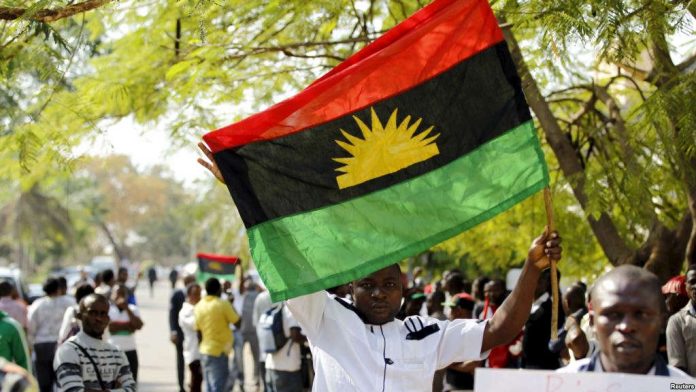The Indigenous People of Biafra (IPOB) has asked Justice James Omotosho of the Abuja Federal High Court to give an account of how its leader, Nnamdi Kanu, was convicted.
News360 Info reports that Omotosho convicted Kanu on terrorism charges brought against him by the Nigerian government and subsequently sentenced him to life imprisonment.
Speaking on the development via a statement by its spokesman, Emma Powerful, on Friday, the group asserted that there were defects, contradictions, and illegalities in Omotosho’s ruling.
Powerful restated Kanu and his defence team’s argument that the Terrorism Prevention Amendment Act 2013, under which he was charged, had been repealed by the Terrorism (Prevention and Prohibition Act 2022.
The statement titled, ‘Justice Omotosho must explain the law under which he purported to convict Mazi Nnamdi Kanu’, read, “The Indigenous People of Biafra (IPOB) wishes to inform the global community, diplomatic missions, international media, and lovers of freedom that we shall, in the coming days and weeks, lay bare the fundamental defects, contradictions, and illegalities that define the recent ruling issued by Justice James Omotosho of the Federal High Court, Abuja
“For the avoidance of doubt, no gun, no grenade, no GPMG, no explosive, and no attack plan was ever found on Mazi Nnamdi Kanu. None. No witness, civilian or military, ever testified before any court, at any stage, that Mazi Nnamdi Kanu committed any offence known to Nigerian or international law. This is an undeniable fact.
“The only offence” is self-determination, which is not a crime anywhere in the world. The only thing the Nigerian government continues to criminalise is self-determination, a right guaranteed under Article 20 of the African Charter on Human and Peoples’ Rights, Article 1 of the International Covenant on Civil and Political Rights (ICCPR), and Article 1 of the International Covenant on Economic, Social and Cultural Rights (ICESCR).
“Self-determination is a protected right, not a crime. Agitation is not terrorism, and requesting a referendum is not a weapon.
“Meanwhile, the politically manufactured insecurity in the South-East escalated while Mazi Nnamdi Kanu was in solitary confinement at the DSS facility, cut off from the outside world. No honest observer can attribute to him acts that occurred while he was physically incapable of involvement.”
The statement stressed that it was the Nigerian military that attacked Kanu and IPOB members.
“IPOB reminds the world that it was Mazi Nnamdi Kanu who was attacked by the Nigerian military during Operation Python Dance. It was IPOB family members who were massacred at Nkpor, Aba, Onitsha, Emene, and other locations. Not one government officer or soldier has been held accountable for these atrocities. Yet the same system now seeks to convict the victim,” the statement said.
IPOB declared that the judgment delivered by Justice Omotosho was a “legal impossibly” under Section 36(12) of the Constitution which stated, “A person shall not be convicted of a criminal offence unless that offence is defined and the penalty therefore is prescribed in a written law.
“Our questions to Justice Omotosho, questions the entire world deserves answers to, are as follows: What written law did you rely on to purport to convict Mazi Nnamdi Kanu? Is that law extant, or has it been repealed? If the law has been repealed, can a repealed law ever qualify as a written law under Section 36(12)? Why did you ignore binding Court of Appeal and Supreme Court authorities stating that no Nigerian can be tried or convicted under a non-existent or repealed statute?
“A judge cannot manufacture an offence from thin air. A court cannot resurrect a dead law. A repealed legislation cannot convict a living person.”
Vowing to expose the ruling, the statement added, “The global family of IPOB will, beginning immediately, expose and dissect every line of Omotosho’s ruling for the world to see the depth of the judicial malpractice at play. Nigeria must not be allowed to tarnish the last remnants of its judiciary’s credibility by permitting such unconstitutional conduct.”






